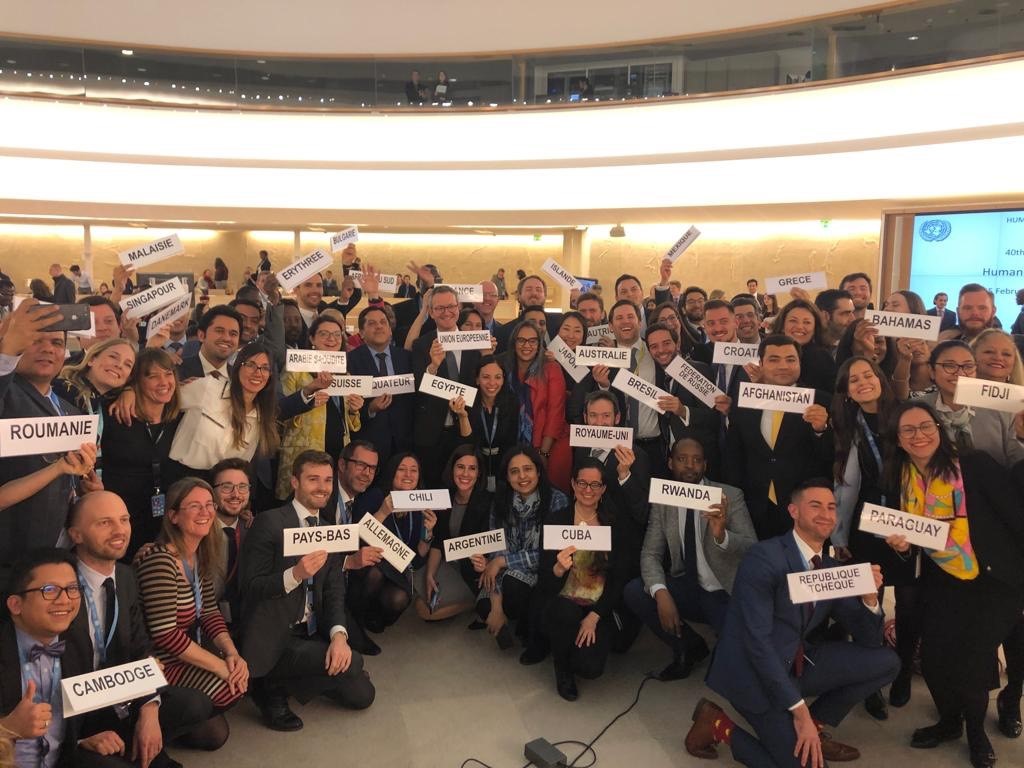25th March 2019 Geneva, Switzerland
Fretful Felines at Forty
Last autumn, Pixie – our much loved cat (and subject of a 2015 blog trilogy) – fell seriously ill. After a week in pet hospital, the vets advised that she needed an urgent blood transfusion to survive. Except they didn’t have any cat blood in stock, so they asked if I could round up some local cat volunteers from different blood groups. I spent the day approaching neighbours to see if their cats might be willing to make a donation, while trying to sound like this was a perfectly normal thing to be asking, before driving a car full of caged and protesting felines down the motorway to take their blood. It was one of the stranger experiences I’ve had in recent years and gave real meaning to the phrase ‘herding cats’. Anyone who has spent the last 4 weeks leading on a resolution at the Human Rights Council will know how it felt.
Being responsible for a resolution is a deeply uncomfortable experience. However much preparation you put in, you never really know if you’ve got things under control until the last minute, and most of the time is spent reacting to surprise problems before they spin out of control. However calm you try to appear, it’s impossible to be truly at ease which means you spend a full four weeks oscillating between different levels of anxiety.
Happily this was one of the better sessions, with strong outcomes on some of the world’s most serious human rights crises. The Council renewed important mechanisms to monitor Iran, Myanmar, Syria and North Korea, though regrettably in all four cases, the authorities refuse to engage with the Council.
The situation in South Sudan remains extremely grave, with recent violations that could amount to war crimes and crimes against humanity. The excellent Commission on Human Rights on South Sudan is the strongest of all the Council’s monitoring bodies and was renewed by consensus. The South Sudan Government deserves credit for agreeing to cooperate with this important body for a further year.
Sri Lanka also maintained its cooperation with the Council and again co-sponsored a resolution requesting it to implement fully the commitments Sri Lanka gave to the Council in 2015. The 2015 resolution contains a broad range of measures to advance peace justice and reconciliation, and remains a key document for the many thousands of victims of violations and abuses over many years. Sri Lanka’s cooperation with the UN is very welcome but the Government has been slow to deliver on its commitments, and victims from all communities are looking to see much greater progress from now on.
There were some important new issues as well. Several Latin American countries worked with Canada on a first resolution to request a report on Nicaragua, who has just joined the Council. This was an important response to the crisis which began last April following social protests and which, according to the UN, has left hundreds dead, thousands injured and many political prisoners detained. Following the resolution on Venezuela last September, it was encouraging to again see countries from Latin American using the Council to apply international pressure on a country in their region.
Iceland made a first joint statement on Saudi Arabia on behalf of over 35 countries, calling for the release of human rights defenders and condemning the killing of Jamal Khashoggi. The UK made a joint statement on the ongoing persecution of LGBTI people in Chechnya , highlighting reports of deaths, torture and arbitrary detentions, and a separate statement calling on Cameroon to accept international assistance following a serious human rights deterioration in its North-West and South West regions. For good measure we also delivered a statement for the cross regional Core Group on the Rule of Law on access to justice for children and young people, which drew wide support.
One issue which did not get the attention which NGOs had wanted was the mass detention of Uighurs in China’s Xinjiang region. The UK was one of 4 countries to support a US side event on Xinjiang and expressed concern in a number of statements to the Council. But China worked hard to ensure that most states who spoke during the consideration of China’s Universal Periodic Review report raised only platitudes rather than concerns. China’s consistent claim throughout the session that there were no detention camps, only “campuses” for vocational training left no one convinced, and it is clear that China should allow access to independent human rights mechanisms to make their own assessment.

Among the bigger talking points on the Council’s final day was the voting positions on the resolutions on the Occupied Palestinian Territories. The UK voted against all item 7 resolutions for the first time, in line with the position set out to the Council last March. But the UK abstained on the one resolution which Palestine proposed under item 2, an agenda item which is open to all situations. The UK statement made clear that the scrutiny of Israel was warranted when addressed under agenda items, which don’t reflect the institutional bias of item 7.
This was the Council’s 40th session, and the first chance to assess the voting record of its new membership following the biggest change to its composition since its early years. Fiji and the Bahamas, both serving on the Council for the first time, deserve credit for their positive engagement. And it was good to see South Africa -a Council veteran – voting in favour of some country resolutions this time. Less positive was Japan’s continuing abstention on the Myanmar resolution, which came on the back of a surprise decision to withdraw as main sponsors of the DPRK resolution earlier in the session.
The Council now takes a brief pause until it resumes in June, though informal consultations will soon begin on how the Council should approach the impending review of its status by the UN General Assembly. I’m hoping for at least a few weeks of relatively low stress, feline health permitting.

Given the multitude of contemporary conflicts, South Sudan does not get a lot of media attention these days – it’s good to see the continued attention to the situation at the Council.